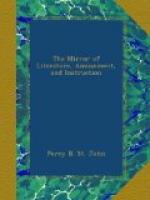T. W.
* * * * *
POPULAR SUPERSTITIONS.
(For the Mirror.)
No man will be found in whose
mind airy notions do not sometimes
tyrannize and force him to
hope or fear beyond the limits of sober
probability.—Johnson.
The superstitions of nations must always be interesting, since they afford a criterion of the progress that knowledge and reason have made. To trace the origin of the belief that departed spirits revisit the earth, a belief apparently so repugnant to reason and revelation, must ever attract the attention of the curious. For it is a question of importance to religion, even although the existence of apparitions would not in the slightest degree invalidate those sacred writings on which the bases of religion are founded; on the contrary, if the reality of apparitions (that is of the existence of apparitions) could be ascertained, another proof would be added to an immense weight of testimony of the ability possessed by the Deity to arrest or alter what appears the ordinary course of nature.
The existence of apparitions has been acknowledged by many, and a tendency towards a belief of them is to be remarked in many more. Ardent, and what is stranger still, since directly opposed to ardent, morbid minds are too ready to embrace “the pleasing dreadful thought,” and to this may be attributed the prevalence of this kind of superstition among the poets, and all indeed of an enthusiastic temperament.[3] Some of the tales urged in defence of apparitions are upon a prima facie observation to be traced to an exuberance[4] of imagination on the part of the ghost, others that are plainly false, and others that as they cannot be authenticated, are not worthy of notice. I shall here give what I consider an example of the former.
[3] Dr. Johnson, it is well
known, was a firm believer in
ghosts,
as the following extract will show:—“That
the dead are
seen
no more,” said Imlac, “I will undertake
to maintain,
against
the concurrent and unvaried testimony of all ages,
and
of
all nations. * * * This opinion which, perhaps, prevails
as
far
as human nature is diffused, could become universal
only by
its
truth(!): those that never heard of one another
would not
have
agreed in a tale which nothing but experience could
make
credible.”—Rasselas,
chap. xxx.
[4] When the grammarians could
not interpret some word in a
sentence,
which they could make without it, they used to
attribute
the unfortunate word to a natural redundancy in the
language,
and in the same manner all ghost stories could be
solved
by referring it to “an exuberance,” &c.
&c.




